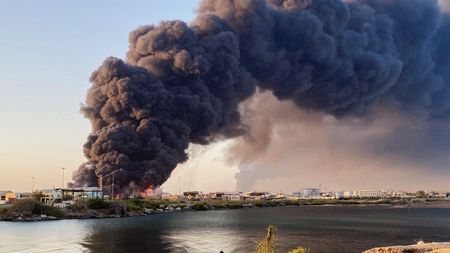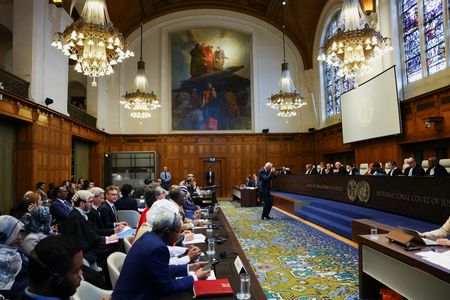(Reuters) -Multiple explosions and fires were seen and heard in Sudan’s capital Port Sudan early on Tuesday, a witness said, though the exact locations and causes were unclear, as a civil war rocks the previously quiet city for the third day.
Dark plumes of smoke could be seen emerging from the vicinity of the country’s main maritime port in the city where hundreds of thousands of displaced people have sought refuge.
The conflict between the army and the paramilitary Rapid Support Forces has created the world’s worst humanitarian crisis, one likely to be worsened by the attacks on Port Sudan, where U.N. officials, diplomats, aid agencies and the army-aligned government ministries have set up headquarters.
A major hotel in the vicinity of the residence of the country’s leader General Abdelfattah al-Burhan was also hit in the attack, the witness said.
The attacks which began Sunday represent a sharp escalation in fighting, as the Red Sea coastal city had remained untouched by ground or air attacks until this week.
On Sunday, a military base near Sudan’s only functioning international airport, had been struck by drones followed by the targeting on Monday of fuel depots in the city.
In both cases military sources blamed the paramilitary Rapid Support Forces. The attacks came after a military source said the army had destroyed an aircraft and weapons depots in the RSF-controlled Nyala airport. The RSF did not claim responsibility for the attacks.
The attacks this week drew condemnation from neighbors Egypt and Saudi Arabia, as well as expressions of concern from the United Nations.
Since April 2023, Sudan has been gripped by war between the army and RSF, triggered by a dispute over a transition to civilian rule. The conflict has displaced over 12 million people and pushed half the population into acute hunger, according to the United Nations.
Two years into the war, the army has succeeded in pushing the RSF out of most of central Sudan, and the paramilitary has shifted tactics from ground incursions to drone attacks targeting power stations and other facilities deep in army-controlled territory.
The army has continued airstrikes in the Darfur region, the RSF’s stronghold. The two forces continue to fight ground battles for control of al-Fashir, the capital of North Darfur state, and elsewhere as the battle lines in the war harden into distinct zones of control.
(Writing by Nafisa Eltahir and Yomna Ehab; Editing by Himani Sarkar and Michael Perry)










